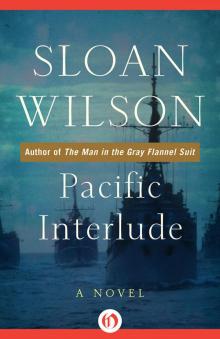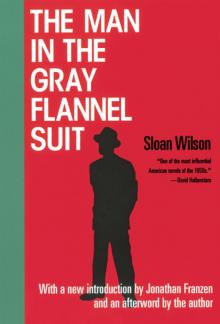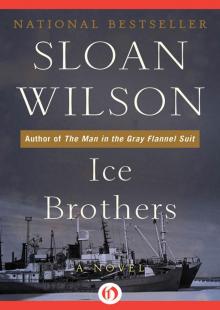- Home
- Sloan Wilson
Man in the Gray Flannel Suit Page 3
Man in the Gray Flannel Suit Read online
Page 3
He paused, still smiling. Tom said nothing.
“Just a few hints,” Walker continued. “Write anything you want, but at the end of your last page, I’d like you to finish this sentence: ‘The most significant fact about me is . . .’ ”
“The most significant fact about me is . . .” Tom repeated idiotically.
“The results, of course, will be entirely confidential.” Walker lifted a bulky arm and inspected his wrist watch. “It’s now five minutes to twelve,” he concluded. “I’ll expect your paper on my desk at precisely one o’clock.”
Tom stood up, put on his coat, said, “Thank you,” and went out of the room. The utilitarian secretary already had a stack of typewriting paper ready for him. She led him to a small room a few doors down the hall in which were a typewriter and a hard office chair. There was a large clock on the wall. The room had no windows. Across the ceiling was a glaring fluorescent light which made the bare white plaster walls look yellow. The secretary walked out without a word, shutting the door silently behind her.
Tom sat down in the chair, which had been designed for a stenographer and was far too small for him. Son of a bitch, he thought–I guess the laws about cruel and unusual punishment don’t apply to personnel men. He tried to think of something to write, but all he could remember was Betsy and the drab little house and the need to buy a new washing machine, and the time he had thrown a vase that cost forty dollars against the wall. “The most significant fact about me is that I once threw a vase costing forty dollars against a wall.” That would be as sensible as anything else he could think of, but he doubted whether it would get him the job. He thought of Janey saying, “It isn’t fair!” and the worn linoleum on the kitchen floor. “The most significant fact about me is . . .” It was a stupid sentence to ask a man to finish.
I have children, he thought–that’s probably the most significant fact about me, the only one that will have much importance for long. Anything about a man can be summed up in numbers. Thomas R. Rath, thirty-three years old, making seven thousand dollars a year, owner of a 1939 Ford, a six-room house, and ten thousand dollars’ worth of G.I. Life Insurance which, in case of his death, would pay his widow about forty dollars a month. Six feet one and a half inches tall; weight, 198 pounds. He served four and a half years in the Army, most of it in Europe and the rest in the South Pacific.
Another statistical fact came to him then, a fact which he knew would be ridiculously melodramatic to put into an application for a job at the United Broadcasting Corporation, or to think about at all. He hadn’t thought about this for a long while. It wasn’t a thing he had deliberately tried to forget–he simply hadn’t thought about it for quite a few years. It was the unreal-sounding, probably irrelevant, but quite accurate fact that he had killed seventeen men.
It had been during the war, of course. He had been a paratrooper. Lots of other people had killed more men than he had. Lots of bomber crews and artillerymen had, but, of course, they never really knew it. Lots of infantrymen and lots of paratroopers had, and most of them knew it. Plenty of men had been dropped behind the enemy lines, as Tom had been on five different occasions, and they had had to do some of their killing silently, with blackjacks and knives. They had known what they were doing, and most of them were healthy enough not to be morbid about it, and not to be proud of it, and not to be ashamed of it. Such things were merely part of the war, the war before the Korean one. It was no longer fashionable to talk about the war, and certainly it had never been fashionable to talk about the number of men one had killed. Tom couldn’t forget the number, “seventeen,” but it didn’t seem real any more; it was just a small, isolated statistic that nobody wanted. His mind went blank. Suddenly the word “Maria” flashed into it.
“The most significant fact about me is that I . . .”
Nonsense, he thought, and brought himself back to the present with a jerk. Only masochists can get along without editing their own memories. Maria was a girl he had known in Italy during the war, a long time ago, and he never thought about her any more, just as he never thought about the seventeen men he had killed. It wasn’t always easy to forget, but it was certainly necessary to try.
“The most significant fact about me is that for four and a half years my profession was jumping out of airplanes with a gun, and now I want to go into public relations.”
That probably wouldn’t get him the job, Tom thought. “The most significant fact about me is that I detest the United Broadcasting Corporation, with all its soap operas, commercials, and yammering studio audiences, and the only reason I’m willing to spend my life in such a ridiculous enterprise is that I want to buy a more expensive house and a better brand of gin.”
That certainly wouldn’t get him the job.
“The most significant fact about me is that I’ve become a cheap cynic.”
That would not be apt to get him the job.
“The most significant fact about me is that as a young man in college, I played the mandolin incessantly. I, champion mandolin player, am applying to you for a position in the public-relations department!”
That would not be likely to get him far. Impatiently he sat down at the typewriter and glanced at his wrist watch. It was a big loud-ticking wrist watch with a black face, luminous figures, and a red sweep hand that rapidly ticked off the seconds. He had bought it years ago at an Army post exchange and had worn it all through the war. The watch was the closest thing to a good-luck charm he had ever had, although he never thought of it as such. Now it was more reassuring to look at than the big impersonal clock on the wall, though both said it was almost twelve-thirty. So far he had written nothing. What the hell, he thought. I was a damn fool to think I wanted to work here anyway. Then he thought of Betsy asking, as she would be sure to, “Did you get the job? How did it go?” And he decided to try.
“Anybody’s life can be summed up in a paragraph,” he wrote. “I was born on November 20, 1920, in my grandmother’s house in South Bay, Connecticut. I was graduated from Covington Academy in 1937, and from Harvard College in 1941. I spent four and a half years in the Army, reaching the rank of captain. Since 1946, I have been employed as an assistant to the director of the Schanenhauser Foundation. I live in Westport, Connecticut, with my wife and three children. From the point of view of the United Broadcasting Corporation, the most significant fact about me is that I am applying for a position in its public-relations department, and after an initial period of learning, I probably would do a good job. I will be glad to answer any questions which seem relevant, but after considerable thought, I have decided that I do not wish to attempt an autobiography as part of an application for a job.”
He typed this paragraph neatly in the precise center of a clean piece of paper, added his name and address, and carried it into Walker’s office. It was only quarter to one, and Walker was obviously surprised to see him. “You’ve still got fifteen minutes!” he said.
“I’ve written all I think is necessary,” Tom replied, and handed him the almost empty page.
Walker read it slowly, his big pale face expressionless. When he had finished it, he dropped it into a drawer. “We’ll let you know our decision in a week or so,” he said.
4
“HOW DID THE INTERVIEW GO?” Betsy asked him that night as soon as he got off the train. “Tell me all about it!”
“I don’t know,” Tom said. “I wouldn’t get my hopes up. I’m one of about forty people being considered.”
“You’ll get it,” she said. “I’m sure you will.”
“Don’t get your hopes up.”
“I talked to a real-estate agent today,” she replied. “He said we could probably get fifteen thousand dollars for our house, maybe more. And he’s got some wonderful places selling for about thirty thousand!”
“For Pete’s sake!” Tom said. “Aren’t you rushing things a little?”
“It doesn’t do any harm to plan, does it?” she asked with an injured air.
“
You better just pretend nothing’s happened at all,” he said. “Then you won’t be disappointed if nothing does happen.”
Tom tried not to think about the interview with Walker. Probably it would be a week or two before he heard from United Broadcasting, he figured, but as things turned out, a letter from Walker arrived at Westport only three days later. Betsy took it from the mailman, ripped it open, and immediately called Tom at the Schanenhauser Foundation. “It’s here!” she said. “The mailman just brought it! Walker wants to see you at eleven o’clock next Tuesday for another interview.”
“Fine,” Tom said noncommittally.
“That means things must be getting pretty serious, doesn’t it? I mean, they wouldn’t want to see you again if you didn’t make a pretty good impresson last time.”
“Maybe.”
“Don’t be stuffy,” Betsy said. “I feel like celebrating. Tonight we’re going to have steak and sparkling Burgundy, and to hell with the cost.”
She hung up before he could object. She’s probably right about one thing, he thought–I don’t think Walker would want to see me if he didn’t have anything for me. It was time to talk to Dick Haver, his boss at the foundation, Tom concluded.
Dick Haver was a tall, tweedy man who had been a college professor. “Why do you want to leave?” he asked Tom that afternoon when Tom had explained the situation.
“Money,” Tom said. “I have three children and I need more money than I think I can make here in the immediate future.”
Haver smiled wanly. “How much do you think you need?” he asked.
“I’d like ten thousand,” Tom said. “And later, I’d like to think I could make more.”
“You could here–in time,” Haver said.
“How much time?”
“Five or six years maybe. Up to now, you’ve been doing fairly well.”
“I’d like a place where there would be more opportunity for rapid advancement,” Tom said.
“Don’t make your decision too quickly,” Haver replied. “I’ll talk the matter over with some of the others here, and we’ll see if we can do a little more for you. I’m not at all sure you’d like it over at United Broadcasting.”
“Why not?”
“It’s just a feeling I have,” Haver said. “Think it over and make your own decision, of course.”
“Nuts!” Betsy exclaimed that night when Tom told her about his conversation with Haver. “The old goat is just trying to hang onto you! He’ll come up with an offer of some piddling raise you should have gotten two years ago, and every time you want another one, you’ll have to threaten to quit!”
She sipped her sparkling Burgundy reflectively a moment. “You know what you ought to do now?” she said. “You ought to go have a talk with Grandmother. After all, she told you about the job at the foundation in the first place, and she might have ways of finding out whether Haver really will have anything big for you. Anyway, she ought to know you’re thinking about leaving–she’d be hurt if she found out about it from anyone else.”
“I guess so,” Tom said reluctantly. “I’ll take a run up to see her Saturday.”
Early Saturday morning he drove to South Bay alone, because by that time all three of the children had chicken pox and Betsy had to stay with them. South Bay is a small town not far from Stamford. When Tom approached it, he got a curious feeling of home-coming which was still strong, despite all the years that had passed since he had lived there. The wide, elm-shaded main street had changed since the war. Brightly painted one-story houses filled the fields where Tom had hunted rabbits as a boy, and even the old nine-hole golf course had miraculously become something called “Shoreline Estates,” in spite of the fact that it was a good two miles inland. The road leading from the main street to his grandmother’s house had changed little, however. The great brick and stone mansions were not quite so well kept as they had been when Tom had ridden his bicycle past them, but they still seemed comfortable, solid, and much more permanent then the recently built structures on the golf course, which looked as though they were quite capable of disappearing as quickly as they had come. At the end of a row of big houses, the road narrowed and started up a steep hill. The old Ford groaned as Tom shifted it into second gear. There were two sharp turns in the road made necessary by massive outcroppings of rock which gave the hill the appearance of a mountain. It was on the second of these turns that Tom’s father, Stephen Rath, had been killed thirty years ago, before Tom was old enough to remember him. Stephen Rath had been driving down the road very late one night at what must have been a vicious speed and had slammed into the rock so hard that his automobile had been completely demolished. Tom had never found why his father had been driving down that narrow road so fast at such an odd hour, and long ago he had learned to stop wondering about it. Now as he passed the rock, he glanced away from it, as he had ever since, at the age of five, he learned that it was the place where his father had been killed.
Stone posts topped by iron urns three feet high marked the entrance to the driveway of his grandmother’s house. Beyond them were the carriage house, which itself was bigger than Tom’s home in Westport, and the rock garden in which his mother and he had spent so many sunny mornings long ago. In the corner of the rock garden stood a heavy stone bench, now almost entirely surrounded by bushes which once had been kept neatly trimmed. At the sight of it, Tom was beset by the same old mixture of emotions from which he always suffered when he visited the place, as though each object there were possessed of a special ghost which leaped out at him as soon as he passed through the gates. His mother had spent countless afternoons sitting on that bench and watching him as he played. Once, when he was about seven years old, he had noticed two lines of verse carved in bold script across the back of the bench. With his forefinger he had traced out the letters grooved in the warm stone and had asked his mother what they meant. Now, almost thirty years later, he could still remember the bitterness in her voice as she read: “The lark’s on the wing; the snail’s on the thorn: God’s in his heaven–all’s right with the world!”
He looked quickly away from the bench which had become so strangely surrounded by bushes, and continued along the driveway. It led to the top of the hill, on the highest point of which was the old mansion itself, a tall Victorian structure with a tower at one end that had been designed to appear even larger and more grandiose than it was. The wind that almost always blew there seemed full of voices.
“It’s a dwarfed castle,” he remembered his mother saying bitterly the year before she died of pneumonia, when he was fifteen years old. “When your father first took me here before we were engaged, he joked about dwarfs in armor behind the parapets at the top of the tower. . . .”
“Here, it’s for you!” he remembered another voice saying, the voice of his grandmother. She had been holding a beautifully polished, old-fashioned, deep-bellied mandolin out to him–he couldn’t have been more than ten or twelve years old at the time. “Your father used to play it,” she had said. “Maybe you’d like to learn.”
Now Tom paused at the top of the hill. There was a breath-taking view of Long Island Sound, with the bright water mottled by the shadows of clouds. The grass on both sides of the driveway had grown long. Looking at it, Tom remembered the days when it had been kept as carefully as a putting green and felt the first pang of the rising annoyance he feared every time he went there, the rage at his grandmother’s refusal to sell the place, and her calm willingness to pour into it what little was left of the money she had inherited from her husband and father.
“I love this place, and I’ll keep it as long as I can pay the taxes on it,” she had said when, shortly after the war, Tom had suggested that she move.
He left his car by the front door. Edward, a tall old man who long ago had served as her butler and now acted as a man of all work, let him in. “Good morning, Mr. Rath,” he said deferentially. “Mrs. Rath is waiting for you in the sunroom.”
Tom found his grandmother sea
ted in an armchair, dressed in a long white gown. In her hand was a gnarled black walnut cane which looked almost like an extension of her withered fingers. She was ninety-three years old.
“Tommy!” she said when she saw him, and leaned eagerly forward in her chair.
“Don’t get up, Grandmother,” he said. “It’s good to see you.”
The old lady peered at him sharply. He was shocked at how much she had aged during the past two months, or perhaps it was just that he persisted in remembering her as a younger woman and was surprised now, each time he saw her. And she in turn was shocked to see Tom, whom she remembered as a young boy. She continued to stare at him, her old eyes bright and disarmingly kind.
“You look tired, Tommy,” she said suddenly.
“I feel fine.”
“You’re getting a little stout,” she said bluntly.
“I’m getting older, Grandmother.”
“You ought to go riding more,” she said. “The Senator always said riding is the best exercise. He used to ride for an hour almost every morning.”
There it was, her terrible projection of the past into the present, which was more a deliberate refusal to face change than a passive acquiescence to senility. And there too was her elaborate myth about the Rath family’s accomplishments. “The Senator” was the phrase she always used for her dead husband, Tom’s grandfather, who had served one term as a State Senator in Hartford during his early youth, and who had spent most of the rest of his life doing absolutely nothing.
“I’ve got a few things I want to talk over with you,” Tom began, trying to change the subject.
“You mustn’t get stout,” the old lady went on relentlessly. “Your father never got stout. Stephen was always slender.”
“Yes, Grandmother,” he said. Sometimes he imagined that she deliberately dwelt upon painful subjects, for she enjoyed talking about his father with him, presenting a caricature of a hero, elaborated by all kinds of distorted facts, hidden among which Tom often caught glimpses of what he suspected were unpleasant truths. What were the facts about his father? Tom had had to piece them together from trifles. “I don’t know why, but Stephen never played the mandolin after the war,” the old lady had told him once long ago. “At college he was in the Mandolin Club, and even as a boy he played beautifully, but after the war he never did it any more.”

 A Summer Place
A Summer Place Pacific Interlude
Pacific Interlude Man in the Gray Flannel Suit
Man in the Gray Flannel Suit Ice Brothers
Ice Brothers